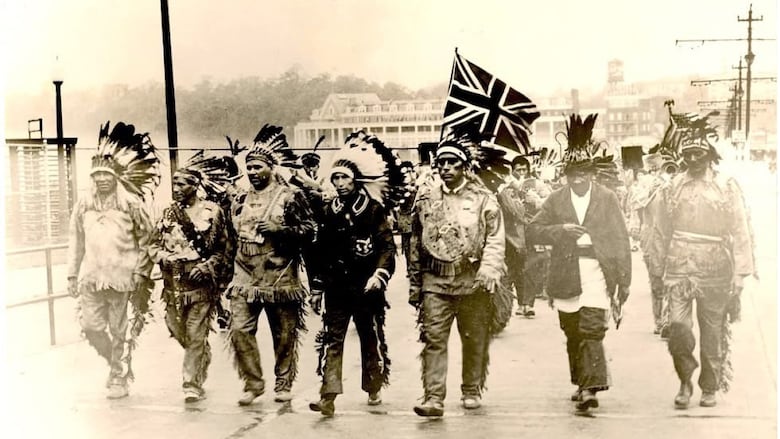Celebration of Indigenous rights at border crossing event is 'trauma healing'
Event also recalls renowned leaders who fought for Indigenous rights 100 years ago

This year's commemoration of the Jay Treaty is not just a celebration of First Nations right to freely cross the border — it's a reminder to Canada and the U.S.
Every third Saturday of July for the past 98 years, people gather on the Rainbow Bridge between Niagara Falls, N.Y. and Niagara Falls, ON to reaffirm the tenets within the Jay Treaty, which allows some Indigenous peoples to freely cross the Canada-U.S. border under certain circumstances.
The event is presented by the Indian Defense League of America (IDLA), a volunteer organization composed of delegations from different nations spanning the border, founded in 1926 to advocate for the rights of Indigenous peoples.
Organizer Audrey Hill, who is Kanien'kehá:ka from the Six Nations of the Grand River Territory, said she remembers going to the event as a child. Back then, her parents were the organizers.
"I just went because it was an event being put on by my family. But I also learned about Deskaheh, as well as Chief Clinton Rickard, and that whole experience that affected us all," Hill said.
Deskaheh and Rickard are still renowned for their advocacy 100 years later.

In the 1920s, many nations that spanned the border were being arrested and denied their rights at the U.S.-Canada crossing because of the U.S. Immigration Act of 1924 which restricted their free movement — movement that was guaranteed under the Jay Treaty.
The Jay Treaty was signed in 1794 between Great Britain and the United States. It gave "American Indians" who were born in Canada the ability to freely enter the United States for travel, studies, employment, retirement and immigration.
Cayuga Chief Deskaheh travelled to Geneva, Switzerland in the 1920s to speak before the League of Nations (precursor to the United Nations) to advocate for the rights of the Haudenosaunee people which were being violated by Canada.
He was prevented from speaking at the League of Nations, and upon his return to North America, he was not allowed to return to his home on Six Nations of the Grand River either.
Deskaheh spent his final days at the home of his dear friend Rickard on the Tuscarora Reservation in Sanborn, N.Y. where some say he died of a broken heart.
Rickard promised his friend he'd continue the fight and founded the IDLA. The first border crossing was in 1928.
Hill said there is strength in continuity and all nations gathering all these years later to remind people of their rights and history.
"Coming together as family, people and coming together for events it's actually trauma healing," she said.
"Because we all experience those same things even though we were put on different reservations."
About 100 to 150 people are expected to be in attendance. The bridge crossing will be followed by traditional smoke dancing, food and speeches.
Hill said in the past organizers worked cooperatively with the Niagara Falls Bridge Commission and Canada Border Services Agency (CBSA) who have agents cross with them to avoid hecklers.
In an email to CBC Indigenous, CBSA spokesperson Jacqueline Roby said that although the 1956 Supreme Court of Canada determined that the Jay Treaty is not in force in Canada, "the Government of Canada is currently engaging and working with the Jay Treaty Border Alliance to co-develop solutions to address matters related to right of entry, identification & documentation, border crossing experience and entry of goods."
The Alliance, established in 2017 by tribal governments in the US and First Nations in Canada, advocates for their membership's border crossing issues.
Roby said since January there have been "no changes as to how the CBSA processes travellers at Canada's ports of entry, including with respect to interim measures put in place by the Minister of Immigration, Refugees and Citizenship to reunite families of Indigenous people separated by the Canada-U.S. border."
Medicine Line
Six Nations scholar and historian, Thohahoken Michael Doxtater will be the guest speaker at the event on Saturday.
Doxtater said the Jay Treaty recognizes an international treaty right of Indigenous peoples to travel safely across the border which was actually created by Native people.
He said in 1763, during the French and Indian War, the border was called the Medicine Line, "created by our leaders not to separate us, but to keep the Europeans from fighting each other. And that was affirmed in the Jay Treaty, which saw the Medicine Line... as not applicable to us."

Although the Jay Treaty is not recognized in Canada, Doxtater said it was in fact, reaffirmed in Canada by the Sioui case, a 1990 Supreme Court decision that ruled in favour of the Huron-Wendat Nation of Wendake, near Quebec City. It is considered significant in the development of modern treaty interpretation principles.
The court confirmed that a document signed by General James Murray on Sept. 5, 1760 guaranteed the Huron-Wendat's right to "the free exercise of their religion, their customs, and liberty of trading with the English" and was never terminated.

Katsenhaiénton Lazare, from Kahnawà:ke, has attended the event since 2023. This year he will be opening the celebration in Kanien'kéha with a tobacco burning.
He said this year the event is particularly important with the "geopolitical battles" happening with U.S. immigration. Lazare said while the U.S. is making it difficult to assert Indigenous rights, it's important for his people to "to continue pushing back."
"We do that every year to make people aware and to remind everybody that we are still here and that we still have rights to this land and that the federal governments of Canada and the United States have a moral and legal obligation to do right by us."


